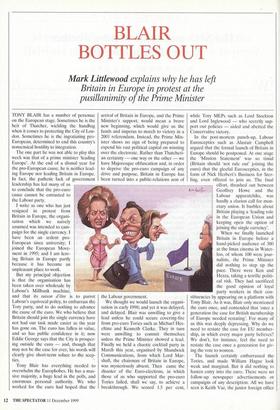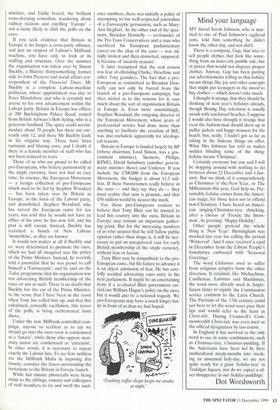BLAIR BOTTLES OUT
Mark Littlewood explains why he has left Britain in Europe in protest at the pusillanimity of the Prime Minister
TONY BLAIR has a number of personae on the European stage. Sometimes he is the heir of Thatcher, wielding the handbag when it comes to protecting the City of Lon- don. Sometimes he is the ingratiating pro- European, determined to end this country's nonsensical hostility to integration.
The one part he was not able to play this week was that of a prime minister 'leading Europe'. At the end of a dismal year for the pro-European cause, he is neither lead- ing Europe nor leading Britain in Europe. In fact, the pathetic lack of government leadership has led many of us to conclude that the pro-euro cause cannot be entrusted to the Labour party.
I write as one who has just resigned in protest from Britain in Europe, the organi- sation which we naively assumed was intended to cam- paign for the single currency. I have been an ardent pro- European since university; I joined the European Move- ment in 1995; and I am leav- ing Britain in Europe partly because it has become an unpleasant place to work.
But my principal objection is that the organisation has been taken over wholesale by Labour's Millbank machine; and that its raison &etre is to parrot Labour's equivocal policy, to embarrass the Tory party, and to do nothing to advance the cause of the euro. We who believe that Britain should join the single currency have not had our task made easier as the year has gone on. The euro has fallen in value, and so has public confidence in it; now Eddie George says that the City is prosper- ing outside the euro — and, though that may not be the case for ever, his words will clearly give short-term solace to the scep- tics.
Tony Blair has everything needed to overwhelm the Europhobes. He has a mas- sive majority, a huge lead in the polls, and enormous personal authority. We who worked for the euro had hoped that the arrival of Britain in Europe, and the Prime Minister's support, would mean a brave new beginning, which would give us the funds and impetus to march to victory in a 2001 referendum. Instead, the Prime Min- ister shows no sign of being prepared to expend his vast political capital on winning over the electorate. Rather than Thatcheri- an certainty — one way or the other — we have Majoresque obfuscation and, in order to deprive the pro-euro campaign of any drive and purpose, Britain in Europe has been turned into a public-relations arm of the Labour government.
We thought we would launch the organi- sation in early 1998; and yet it was delayed, and delayed. Blair was unwilling to give a lead unless he could secure covering-fire from pro-euro Tories such as Michael Hes- eltine and Kenneth Clarke. They in turn were unwilling to commit themselves unless the Prime Minister showed a lead. Finally we held a chaotic cocktail party in March this year, organised by Shandwick Communications, from which Lord Mar- shall, the chairman of Britain in Europe, was mysteriously absent. Then came the disaster of the Euro-elections, in which those of us who supported the pro-euro Tories failed, shall we say, to achieve a breakthrough. We scored 1.5 per cent, while Tory MEPs such as Lord Stockton and Lord Inglewood — who secretly sup- port our policies — aided and abetted the Conservative victory.
In the post-mortem punch-up, Labour Eurosceptics such as Alastair Campbell argued that the formal launch of Britain in Europe should be postponed. At one stage the 'Mission Statement' was so timid (Britain should 'not rule out' joining the euro) that the gleeful Eurosceptics, in the form of Nick Herbert's Business for Ster- ling, even offered to join us. The final effort, thrashed out between Geoffrey Howe and the Labour apparatchiks, was hardly a clarion call for mon- etary union. It burbles about Britain playing a 'leading role in the European Union and keeping open the option of joining the single currency'.
The launch certainly embarrassed the Tories, and made William Hague look weak and marginal. But it did nothing to hasten entry into the euro. There were no follow-up newspaper advertisements or campaigns of any description. All we have seen is Keith Vaz, the junior foreign office minister, and Eddie Izzard, the brilliant cross-dressing comedian, wandering about railway stations and extolling 'Europe' not a tactic likely to shift the polls on the euro.
If you seek evidence that Britain in Europe is no longer a cross-party alliance, and just an outpost of Labour's Millbank machine, you have only to look at its staffing and structure, Over the summer the organisation was taken over by Simon Buckby, a Blairite thirtysomething, former aide to John Prescott and social affairs cor- respondent of the Financial Times. Mr Buckby is a complete Labour-machine politician, whose appointment was due to Peter Mandelson, and who is certainly not averse to his own advancement within the Labour party. Britain in Europe has offices at 200 Buckingham Palace Road, rented from British Airways's Bob Ayling, who is a generous landlord. The space could accom- modate about 70 people but there are cur- rently only 12, and these Mr Buckby leads in his singular way. There have been tantrums and blazing rows, and I doubt if there is a female member of staff who has not been reduced to tears.
Those of us who are proud to be called pro-Europeans, who believe passionately in the single currency, have not had an easy time. In essence, the European Movement — a benign collection of pro-Europeans which used to be led by Stephen Woodard — has been taken over by Britain in Europe, in the form of the Labour party, and demolished. Stephen Woodard, who has served the European cause for ten years, was told that he would not have an office of his own; he has now left, and his post is still vacant. Instead, Buckby has recruited a bunch of New Labour 'munchkins', as they are known.
It would not matter at all if Buckby and co. were determined to promote the euro, which we had all imagined was the policy of the Prime Minister, Instead, he recently told a journalist that he was proud to call himself a 'Eurosceptic', and he said on the Today programme that his organisation was not advocating British membership of the euro, or not as such. There is no doubt that Buckby has the ear of the Prime Minister, in the sense that I have been in the room when Tony has called him up, and that this calculated, cowardly vacillation, this terror of the polls, is being orchestrated from above.
Under the new Millbank-controlled cam- paign, anyone so reckless as to say we should go into the euro soon is condemned as a 'fanatic', while those who oppose mon- etary union are condemned as 'extremist'.
In other words, it is necessary to repeat exactly the Labour line. To see how ruthless are the Millbank Mafia in imposing this inanity, consider the fiasco surrounding the invitations to the Britain in Europe launch. While last minute phonecalls were being made to the siblings, cousins and colleagues of staff members to try and swell the audi- ence numbers, there was initially a policy of attempting to bar well-respected journalists of a Eurosceptic persuasion, such as Mary- Ann Sieghart. At the other end of the spec- trum, Brendan Donnelly — co-founder of the Pro Euro Conservatives and a man who sacrificed his European parliamentary career on the altar of the euro — was ini- tially invited and then disinvited, supposed- ly because of 'security reasons'.
It later transpired that the real reason was fear of offending Clarke, Heseltine and other Tory grandees. The fact that a pro- European as committed as Brendan Don- nelly can not only be barred from the launch of a pro-European campaign, but then misled as to the reasons for it, says much about the sort of organisation Britain in Europe is. Even more astonishingly, Stephen Woodard, the outgoing director of the European Movement, whose years of professional service had done more than anything to facilitate the creation of BiE, was also excluded, apparently for ideologi- cal reasons.
Britain in Europe is funded largely by BP (whose chairman, Lord Simon, was a gov- ernment minister), Siemens, Philips, KPMG, David Sainsbury (another govern- ment minister there) and Unilever. If you include the £700,000 from the European Movement, the budget is about £1.5 mil- lion. If these businessmen really believe in the euro — and they say they do — they must realise that sum is peanuts, and that £50 million would be nearer the mark.
For those pro-Europeans content to believe that Tony Blair can be trusted to lead this country into the euro, Britain in Europe may remain an important gather- ing point. But for the increasing numbers of us who suspect that he will follow public opinion rather than shape it, it will be nec- essary to put an unequivocal case for early British membership of the single currency, without fear or favour.
Tony Blair may be sympathetic to the pro- European cause, but his failure to advance it is an abject admission of fear. He has care- fully avoided advocating euro entry in the next parliament. It might be an entertaining irony if a re-elected Blair government car- ried out William Hague's policy on the euro, but it would also be a national tragedy. We pro-Europeans may have a much longer bat- tle in front of us than we had hoped.
'Trashing coffee shops keeps me awake at night.'



























































































 Previous page
Previous page